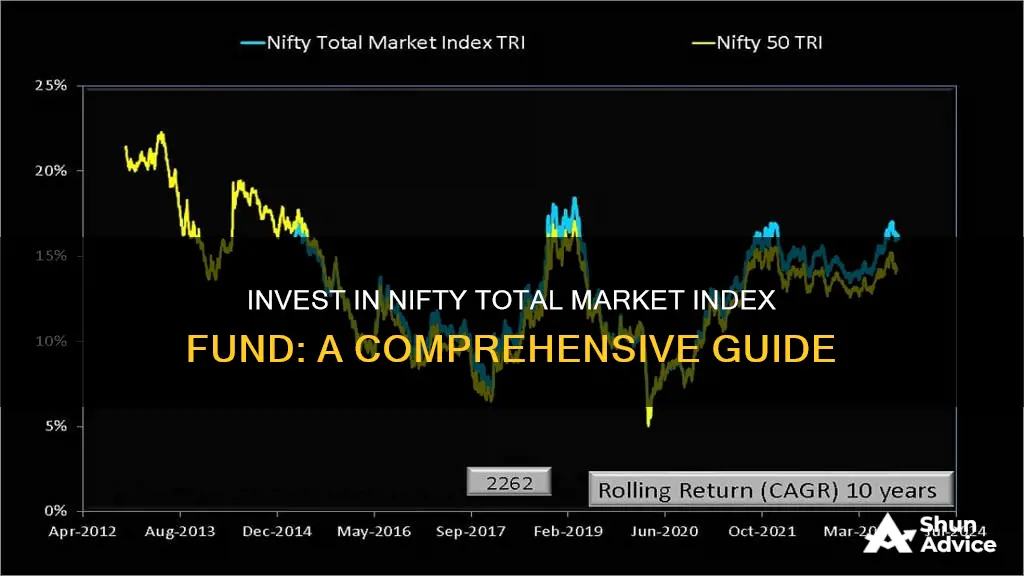
The Nifty Total Market Index is a comprehensive index comprising 750 stocks from various market segments, including large, mid, small, and micro-cap. The index is designed to provide a broad representation of the overall stock market and is often used as a benchmark for investment performance. A total market index fund offers instant diversification across a wide range of stocks and sectors, reducing the risk of loss. It is also a low-cost investment option due to its passive management, and its simplicity makes it accessible to new investors. However, it is important to remember that the value of this type of investment is subject to market risks and can fluctuate with overall market conditions and macroeconomic factors.
| Characteristics | Values |
|---|---|
| Number of Constituents | 750 |
| Coverage | Large-cap, mid-cap, small-cap, and micro-cap companies |
| Companies | Part of the Nifty 500 index and Nifty Microcap 250 index |
| Stock Weight | Based on free-float market capitalization |
| Base Date | 1st April 2005 |
| Base Value | 1000 |
| Index Review | Semi-annually |
| Expense Ratio | 0.30% |
| Exit Load | 0.25% if redeemed within 7 days |
| Taxation | 20% if redeemed within one year; 12.5% if redeemed after one year for returns exceeding Rs. 1.25 lakh |
| Minimum Investment | Rs. 100 for SIP; Rs. 100 for lumpsum |
What You'll Learn

What is a Nifty Total Market Index Fund?
The Nifty Total Market Index is a comprehensive index comprising 750 stocks from various market segments, including large, mid, small, and micro-cap. The index tracks the performance of these 750 stocks, which cover large, mid, small, and micro-cap segments via a single index. The stocks that are part of the Nifty 500 Index and the Nifty Microcap 250 Index constitute the Nifty Total Market Index.
The weight of each stock in the index is based on its free-float market capitalization, meaning the largest companies in the index have the biggest impact on its performance. The index has a base date of April 1, 2005, with a base value of 1000. It is reviewed semi-annually.
A total market index fund is a type of mutual fund or exchange-traded fund (ETF) that tracks a total market index. When investing in a total market index fund, you are buying a small piece of every company in the index. This provides instant diversification across a wide range of stocks and sectors, reducing your risk of loss.
Total market index funds are passively managed, meaning the fund manager does not try to beat the market, and they are typically very low-cost investments. They are also simple to invest in, as they can be bought and sold like any other stock or ETF.
Real Estate Fund Investing: What You Need to Know
You may want to see also

Benefits of investing in a Nifty Total Market Index Fund
Investing in a Nifty Total Market Index Fund offers a range of benefits to investors. Here are some key advantages:
Diversification
The fund provides broad diversification across a wide range of stocks and sectors, with exposure to 750 stocks, including large, mid, small, and micro-cap companies. This diversification helps to reduce investment risk, as your portfolio is not dependent on the performance of any one company or sector.
Low Cost
Nifty Total Market Index Funds are passively managed, meaning the fund manager does not actively try to beat the market. As a result, these funds have low management fees and low expense ratios, making them a cost-effective option for investors.
Simplicity
These funds are easy to invest in, as they can be bought and sold like any other stock or ETF. This simplicity makes them accessible to investors who are new to the stock market.
Performance
The Nifty Total Market Index has historically outperformed the Nifty 50 Index. Over the past five years, it has returned an average of 13.9% per year, compared to 12.4% for the Nifty 50.
Reduced Risk
Index funds, in general, offer reduced risk compared to actively managed funds. The automated investment strategy followed by fund managers removes human bias from investment decisions, ensuring a consistent, unbiased approach.
Exposure to India's Economic Growth
The Nifty Total Market Index is diversified across sectors and market caps, providing exposure to a wide range of Indian companies. This diversification allows investors to benefit from the growth of the Indian economy as a whole.
Value Index Funds: Smart, Long-Term Investment Strategy
You may want to see also

Drawbacks of investing in a Nifty Total Market Index Fund
While investing in a Nifty Total Market Index Fund has its benefits, there are some drawbacks to this strategy. Here are some of the key disadvantages to consider:
- Market Risk: Like any stock or mutual fund investment, investing in the Nifty Total Market Index Fund is subject to market risks. The fund tracks the performance of a broad range of stocks (around 750), so if the Indian stock market performs poorly due to macroeconomic factors, your investment will also lose value.
- Potential Underperformance: While the Nifty Total Market Index Fund provides exposure to a wide range of companies, including smaller companies with high growth potential, it may not be suitable for investors seeking market-beating returns. The fund aims to match the performance of the market, so it may not be the best option for those seeking to outperform the market.
- Lack of Active Fund Management: As the Nifty Total Market Index Fund is passively managed, investors will miss out on active fund management. At certain times, you may want to have higher exposure to specific themes or sectors, which is not possible with this fund. The Nifty 50 is also a more liquid index, providing more flexibility.
- Thinly Spread: The fund is spread very thinly across 750 stocks, so it is neither a return-maximisation nor a risk-optimisation proposition. This means that underperformance in specific sectors or themes may impact the overall returns of the fund.
- Volatility: Mid-cap and small-cap stocks, which are included in the Nifty Total Market Index Fund, tend to go through long phases of underperformance. They also tend to fall more than large-cap stocks during volatile market conditions.
IRA Investment Options: Mutual Funds or ETFs?
You may want to see also

Who should invest in a Nifty Total Market Index Fund?
Nifty Total Market Index funds are a good option for investors who are looking for a low-cost, diversified investment option. They are also suitable for investors new to the stock market, as they are simple to invest in.
Index funds are mutual fund schemes that track a stock market index, such as the Nifty 50. They invest in stocks that constitute a particular market index, and the weightage of these stocks is identical to their proportion of the index. This means that fund managers are not actively involved in investment decisions, resulting in low management fees and a lower expense ratio.
The Nifty Total Market Index is a comprehensive index comprising 750 stocks from various market segments, including large, mid, small, and micro-cap. It provides broad diversification across a wide range of stocks and sectors, reducing the risk of loss. The index has outperformed the Nifty 50 Index over the past five years, returning an average of 13.9% per year compared to 12.4% for the Nifty 50.
However, it's important to remember that the Nifty Total Market Index tracks the performance of a broad range of stocks, so its value can fluctuate with the overall market and macroeconomic conditions. Additionally, mid-cap and small-cap stocks, which are included in the Nifty Total Market Index, tend to go through long phases of underperformance and fall more than large-cap stocks during volatile markets.
Therefore, Nifty Total Market Index funds are a good option for investors seeking low-cost, diversified investments and those new to the stock market. However, investors should be aware of the potential risks associated with market and macroeconomic conditions.
Invest Like Mohnish Pabrai: Fund Strategies and Secrets
You may want to see also

Things to keep in mind before investing in a Nifty Total Market Index Fund
Before investing in a Nifty Total Market Index Fund, there are several things to keep in mind. Firstly, understand the concept of this investment instrument. Index funds are mutual fund schemes that track a stock market index, such as the Nifty 50. They invest in stocks that constitute a particular market index, and the weightage of these stocks is identical to their proportion in the index. Fund managers ensure that the weightage of the portfolio constituents matches that of the index.
Secondly, identify your financial goals and ensure they align with the investment objective of the Nifty Total Market Index Fund. The main objective of index funds is to match the performance of the market, so they may not be suitable for investors seeking market-beating returns.
Thirdly, consider the tracking error, which is the difference between the returns generated by an index fund and its benchmark index. A lower tracking error indicates a better index fund.
Finally, take into account the expense ratio, which is an annual charge levied by fund houses to cover expenses such as management and advertising fees. This fee directly impacts your net annual returns, so a lower expense ratio is preferable.
Additionally, it is important to remember that the Nifty Total Market Index Fund is spread over 750 stocks, including micro-caps, and is not a return-maximization or risk-optimization proposition. It provides instant diversification and has low costs due to passive management, simplicity, and low expense ratios. However, it is subject to market risks, and its value can fluctuate with overall market conditions.
Mutual Funds: A Smart Investment Strategy?
You may want to see also
Frequently asked questions
The Nifty Total Market Index Fund is a comprehensive index comprising 750 stocks from various market segments, including large, mid, small, and microcap. The index tracks the performance of these 750 stocks, which cover large, mid, small, and microcap segments via a single index.
Total market index funds provide broad diversification across a wide range of stocks and sectors, reducing the risk of loss. They are also low-cost investments due to their passive management, and are simple to invest in as they can be bought and sold like any other stock or ETF.
As with any stock or mutual fund investment, your investment in the Nifty Total Market Index Fund is subject to market risks. The main drawback is that it tracks the performance of a broad range of stocks, so its value can fluctuate with the overall market and macroeconomic conditions.







